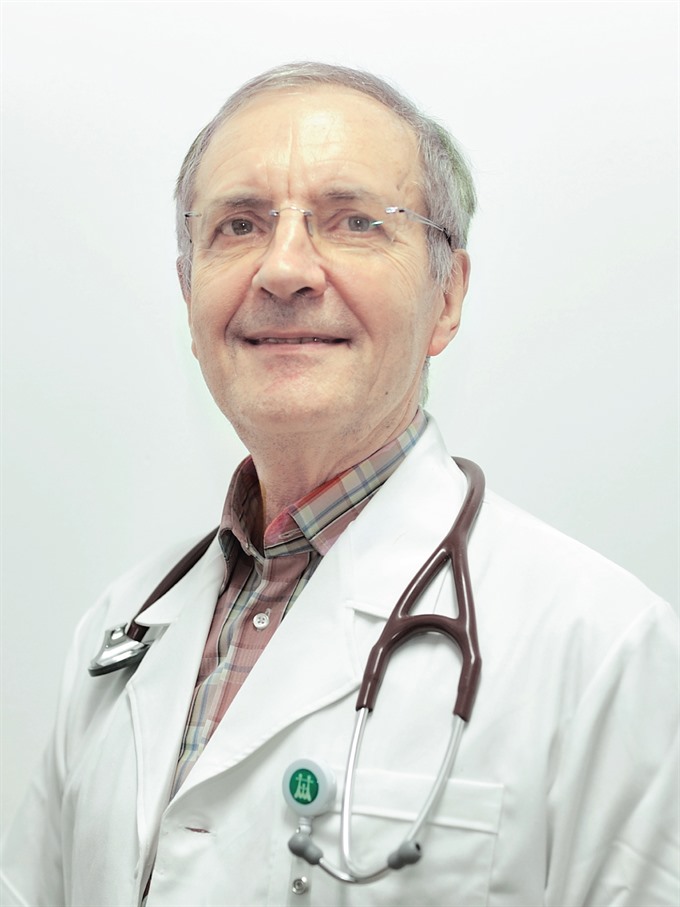 Life & Style
Life & Style

 |
| Dr. Philippe Jean Collin. — Photo courtesy Family Medical Practice Hanoi |
By Dr Philippe Collin *
Autism Spectrum Disorder (ASD) is an umbrella term used to describe a range of lifelong neuro-developmental conditions that impair a person’s behavior and ability to communicate and interact with others.
Autism spectrum disorder can be mild or severe and no one knows what causes it.
It’s difficult to generalize the characteristics of ASD as they can vary so dramatically from person to person, but the hallmarks are communication difficulties, sensory sensitivities and social and emotional development issues.
What are the key symptoms of autism spectrum disorder?
— To be diagnosed with autism spectrum disorder, a child must show signs of the disorder in early childhood. Sometimes the symptoms do not show up until the child is in school. The signs of autism spectrum disorder include problems in two key areas:
Social interaction and social communication: Children with ASD have trouble relating to others:
ü They often don’t know how to read facial expressions, and tend to avoid eye contact.
ü They often dislike being touched. Many young children with ASD prefer not to play or interact with others.
ü Children with ASD often take much longer than other children to learn to speak. Some never learn to speak. But speech is not the only thing that’s affected. The parents of children with ASD sometimes think the children are deaf. But deaf children who cannot speak look for other ways to communicate, such as through hand motions. Children with ASD do not. They do not seem to care whether they can communicate.
Limited interests:
ü Children with ASD tend to show intense interest in certain things. But they show little interest in anything else. Young children might get completely focused on things that spin or shine and ignore most everything else.
ü Older children might become preoccupied with one single topic, such as the weather, numbers or sports.
ü Children with ASD also tend to have rituals that they must follow exactly. For example, they might need to eat particular foods in a specific order, or to take the same route from one place to another—every time. If these habits get disrupted, the children get upset.
What are other things that parents should watch for?
ü Not pointing at objects to show interest (point at an airplane flying over)
ü Not looking at objects when another person points at them
ü Have trouble relating to others or not have an interest in other people at all
ü Avoiding eye contact and wanting to be alone
ü Having trouble understanding other people’s feelings or talking about their feelings
ü Preferring not to be held or cuddled or cuddling only when they want to
ü Appearing to be unaware when other people talk to them but responding to other sounds
ü Be very interested in people, but not know how to talk, play or relate to them
ü Repeating or echoing words or phrases said to them, or repeating words or phrases in place of normal language (echolalia)
ü Having trouble expressing their needs using typical words or motions
ü Not playing “pretend” games (pretending to feed a doll, for instance)
ü Repeating actions over and over again
ü Having trouble adapting when a routine changes
ü Having unusual reactions to the way things smell, taste, look, feel or sound
ü Losing skills they once had (for instance, stop saying words they were once using)
When should I take my child to a doctor or nurse?
Take your child to a doctor or nurse if you see any of the signs listed above. You might also want to have your child’s hearing tested. That way you can find out whether hearing problems are causing some of the symptoms you see.
If the doctor or nurse suspects ASD, he or she will probably send you to see a team of experts who know how to spot the disorder. The members of this team will:
ü Ask you many questions about your child and your family
ü Test your child’s abilities in many ways
ü Make sure that the child’s symptoms are not caused by another problem
If your child does have ASD, the earliest possible diagnosis is vital. Some of the problems caused by ASD can be improved if they are caught early.
How is autism treated?
ASD cannot be cured. However, a healthcare provider can work with parents to develop a treatment plan to help the child reach his or her full potential. The optimal treatment plan depends upon the child’s age, diagnosis, underlying medical problems, and other individual factors.— Family Medical Practice Vietnam
* Dr Philippe Jean Collin is a French Pediatrician with Family Medical Practice Hanoi. He is a member of the French society of pediatrics, American society of nephrologists, and the Pediatric Academy Societies.
For more advice on any medical topic, visit Family Medical Practice Hanoi on 298 I Kim Mã, Ba Đình or on (04) 3843 0748 and hanoi@vietnammedicalpractice.com.
FMP’s downtown HCM City location is at Diamond Plaza, 34 Le Duan, District 1; Other facilities are at: 95 Thảo Điền Street, District 2. Tel: (08) 38227848. E:hcmc@vietnammedicalpractice.com
FMP Danang is located at 96-98 Nguyễn Văn Linh Street, Hải Châu District, Đà Nẵng. Tel: (0236) 3582 699. E: danang@vietnammedicalpractice.com.




